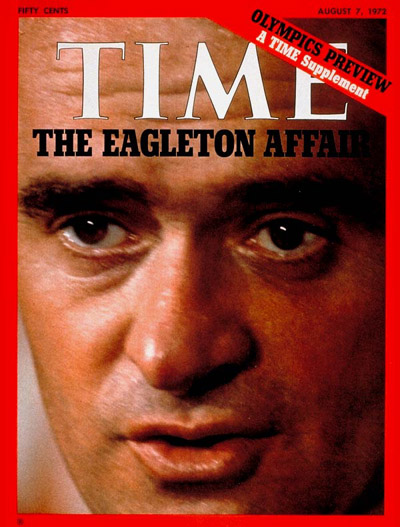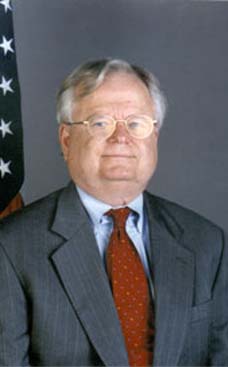
On April 25, 1972, George McGovern won the Massachusetts primary and journalist Bob Novak phoned Democratic politicians around the country, who agreed with his assessment that blue-collar workers voting for McGovern did not understand what he really stood for. On April 27, 1972 Novak reported reported in a column that an unnamed democratic senator had said of McGovern: "The people don’t know McGovern is for amnesty, abortion and legalization of pot. Once middle America - Catholic middle America, in particular - finds this out, he’s dead." The label stuck and McGovern became known as the candidate of "amnesty, abortion and acid." Novak was accused of manufacturing the quote and rebut the criticism, Novak took the senator to lunch after the campaign and asked whether he could identify him as the source but the senator said he would not allow his identity to be revealed. "Oh, he had to run for re-election. The McGovernites would kill him if they knew he had said that," says Novak. On July 15, 2007, Novak disclosed on Meet the Press that the unnamed senator was Thomas Eagleton. Political analyst Bob Shrum says that Eagleton would never have been selected as McGovern's running mate if it had been known at the time that Eagleton was the source of the quote, Eagleton's electro-shock treatments would never have become an issue in the 1972 presidential campaign, and McGovern would have remained politically viable carrying perhaps eight to ten states against Richard Nixon in 1972.
Robert Novak reveals Eagleton as source for "Amnesty, Abortion and Acid"
‘Meet the Press’ transcript for July 15, 2007
MR. HUNT: From the book or the, or the Valerie Plame story? The Valerie Plame story, I think we learned a lot about some of the problems the press has in Washington. Not Bob, I think more others. And I think Bob, in fact, got a bum rap from some people. The book, if I could turn to the book just for a second, it is, I must tell you, it’s a fabulous book, and I say that as someone who thinks that Novak has more wrong views than anyone I’ve ever met in my life. I mean, he really does believe that tax cuts can solve hemorrhoids. But once he gets rid of those silly ideological views, he’s a great reporter.
MR. RUSSERT: But wait, wait a minute. He talks about you in the book, that he thought you were a Cleveland Park kind of, what would you say?
MR. HUNT: Liberal.
MR. NOVAK: Liberal.
MR. RUSSERT: Yeah. But he got to know you on, got to know you on the campaign trail. You talked about politics, sports. Then you went to a dinner party in 1981, both got drunk and had a knock-down, drag-out battle about tax policy.
MR. HUNT: Yeah.
MR. RUSSERT: You know, where I come from, we argue about women, football.
MR. HUNT: Yeah.
MR. RUSSERT: Tax policy?
Story continues below ↓advertisement
Click Here
MR. HUNT: Tim, it was even worse. That was—Chuck Grassley was at that party, the new senator from Iowa. And he had been here for three months. And he was so stunned that he told me, four months ago, he said, “I’ll never forget that night.” He said, “You guys were unbelievable,” and he can’t believe you’re friends. But we got over it.
MR. RUSSERT: Let me read another excerpt from the book, and, Bob Shrum, I think you will be interested in this one. Regarding George McGovern, “April 25,” 1972, “George McGovern captured the Massachusetts primary. The next day I phoned Democratic politicians around the country, who agreed with my assessment that blue-collar workers voting for McGovern did not understand what he really stood for. One was quoted in the fourth paragraph” “Evans & Novak column April 27th: ‘One liberal senator feels McGovern’s surging popularity depends on public ignorance of his acknowledged public positions. “The people don’t know McGovern is for amnesty, abortion and legalization of pot,” he told us.” One “middle America—Catholic middle America, in particular”’”—once they find out, “‘”he’s dead.”’
“With that, McGovern was the triple-A candidate who supported ‘amnesty, abortion and acid.’ The triple-A label was to haunt McGovern into the autumn campaign against Nixon.
“I had not been in touch with” my source “Senator X for 30 years, when I began working on these memoirs in 2003. I wrote him—now Mr. X, retired from the Senate, asking whether I could identify him. His answer was swift and succinct: ‘Dear Bob, what I told you, it was off the record, and I still consider it that way.’” Well, since that time, Mr. X, Senator X died, and he turned out to be, Bob Novak?
MR. NOVAK: Thomas Eagleton. His—the—Mr. McGovern’s brief running mate. He was picked for—as his vice presidential nominee, later resigned from the ticket. But he—that was a secret that was kept until his, his death, and people are—a lot of—a lot of people said I had made up the name. I had gone to Tom Eagleton and asked him if I could clear myself, since the campaign was long over, use his name. He said “Oh, he had to run for re-election. The McGovernites would kill him if they knew he had said that.” But it was Tom Eagleton.
MR. SHRUM: Boy, do I wish he would have let you publish his name. Then he never would have been picked as vice president. Because the two things, the two things that happened to George McGovern—two of the things that happened to him—were the label you put on him, number one, and number two, the Eagleton disaster. We had a messy convention, but he could have, I think in the end, carried eight or 10 states, remained politically viable. And Eagleton was one of the great train wrecks of all time. You know, he had his 85th birthday here yesterday, and a big celebration...
MR. RUSSERT: McGovern.
MR. SHRUM: ...and 35th anniversary of the nomination, and I’m glad I was in the McGovern campaign. I didn’t get to walk the corridors of the White House, but I didn’t have to walk into a federal prison either.
MR. RUSSERT: And happy birthday to George McGovern, turning 85.
MR. NOVAK: Happy birthday.
MR. RUSSERT: He was on this program talking about the Eagleton situation. Here’s George McGovern back in 1972.
(Videotape, October 29, 1972)
SEN. GEORGE McGOVERN (D-SD): There was no way, under the law, that I could have forced Senator Eagleton to step down had he not agreed to do so. And we talked about it. I told him it was my judgment that it was in the national interest that his medical history not become a major issue in this campaign. There were too many other serious issues that we needed to discuss of the kind that we’d been talking about here today. He accepted my judgment on that. He did step down from the ticket.
(End videotape)
MR. RUSSERT: As you know, Senator Eagleton was treated for shock—for depression by shock therapy about 10 years before he was selected. Senator McGovern saying he couldn’t kick him off the ticket, but he could encourage him to resign.
MR. NOVAK: I, I think it’s interesting why he would make that comment to me. He really believed that about McGovern because, although Eagleton was anti-Vietnam, he was a liberal—strong liberal voting record. But he was a dedicated pro-life Catholic who, in fact, in the—during those succeeding 13 years he served in the Senate, had—sponsored a constitutional amendment to overturn Roe v. Wade.
MR. RUSSERT: But, Bob, you raise an interesting point. Just because someone dies, does that mean that you can then identify them?
MR. NOVAK: That’s my, that’s my, my take on it, the take on, by, by a lot of people. I think that, that, that eliminates—that’s—then we can—and I hope that both McGovern—both—as Tom Eagleton and I go to heaven, we can argue it out there. But I believe—I do believe that that removes the responsibility.
MR. RUSSERT: You also identify people, saying, well, the issue’s no longer relevant or it’s no longer important, so I felt it’d be OK to identify people.
MR. NOVAK: That’s, that’s controversial. I thought I would write this memoir as my, as my departure out of Washington and my retirement. A lot of people would like to see me retire, but I am not retiring.
MR. SHRUM: A lot of hope.
MR. NOVAK: I’m never going to retire, and so, and so I did—I do reveal, I reveal some sources. I keep some, I—some of them. I have a lot of permission on some to use their names.
MR. RUSSERT: Al Hunt, should you reveal a source after they die?
MR. HUNT: I think that’s a tough call. I think probably depends on the circumstances and, by and large, I would say that’s OK. I would have trouble revealing a source before they’re dead, if they don’t release you.
MR. RUSSERT: Bob Shrum, Mike Murphy, have you two ever been sources? For Bob Novak?
MR. SHRUM: For Bob Novak? For him?
MR. MURPHY: God forbid, gambling in the casino? No. You should always reveal Shrum.
MR. SHRUM: I’m a source for both of them.
MR. RUSSERT: Here it is: Would you like Novak to reveal things that you said to him after you did?
MR. SHRUM: Well, since I’ve retired and revealed all this stuff in my book, I don’t—in most cases I don’t know that I would mind very much.
MR. MURPHY: Absolutely, absolutely.
MR. NOVAK: Wait a minute, after you told me I can, I can come out with that?
MR. SHRUM: I said, I said in most cases I wouldn’t mind.
MR. MURPHY: Except the predictions.
MR. SHRUM: (Unintelligible)
MR. MURPHY: Yeah, because it’s history then, and I haven’t leaked anything terrible, so, you know...
MR. RUSSERT: In fact, Bob Shrum, in his book, wrote about Mr. Novak. Let’s take a look at his observations about Bob Novak right here on the screen. And it says: “Presidents come and go, but Novak remains.” I’d like to poll that, I’ll tell you that.
The book, “The Prince of Darkness: 50 Years Reporting in Washington.” Bob Novak, Albert Hunt, Mike Murphy, Bob Shrum, thank you. We’ll continue our discussion, and find out more about the story behind Novak’s red vest—and Hunt’s involved in that as well—other revealing tales from his new memoir “Prince of Darkness: 50 Years Reporting in Washington,” our MEET THE PRESS Take Two Web extra on our Web site this afternoon, mtp.msnbc.com. You’ll want to take a look at that. We’ll be right back.
(Announcements)
MR. RUSSERT: That’s all for today. Find out who’ll be meeting the press right now on your cell phone. Text MTP to 46833. Receive weekly alerts on Friday afternoon with Sunday’s MEET THE PRESS guest line-up.
We’ll be back next week. If it’s Sunday, it’s MEET THE PRESS.



















